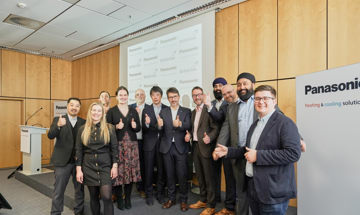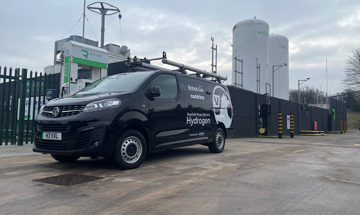New research released by British Gas reveals that when it comes to green energy, 15% believe that when switching to a green energy tariff, the energy itself is supplied from a different green network.
In fact, the energy supplied arrives in the same way and through the same pipes and wires but the supplier matches electricity or gas usage with the equivalent amount of renewable energy or offsets.
And it seems that this confusion is putting people off from switching to a greener tariff. Over a quarter (28%) said that if they understood more about where their energy was coming from, they would be more likely to go green. Almost one in four (23%) said that they find the jargon around green energy daunting.
The research of 2,000 people showed that while there were misunderstandings over tariffs and supply, half (49%) are interested in the sustainability credentials of the products they buy, with almost one in three (30%) interested in changing to a green tariff. According to Ofgem’s Household Consumer Perception of the energy market survey the importance of green energy tariffs for consumer choice increased from just 9% in 2019 to 19% this year
Sustainability continues to be a driver for some with over one in seven (14%) respondents reporting they had stopped using a product or service because it was non-sustainable. In addition, a small but significant proportion of energy consumers (12%) say that their primary reason for switching supplier in the last 5 years was for sustainability-related reasons – now slightly more than for customer services-related issues (11%), whilst cost remains the primary reason for 7 out of 10 customers (72%).
While almost half of respondents (45%) stated they would change to a green tariff if it cost the same as their existing deal, it seems that sustainability is a more vital factor influencing younger customers’ purchasing behaviour. Over one in five (21%) of 18-24 year olds would be willing to pay a premium for sustainable energy, falling to just 7% of 45-54 year olds.
When asked about the measures people would be willing to consider to be more ‘green’, one in four (25%) said they were thinking about buying an electric vehicle (hybrid or full electric), installing a heat pump (12%) and researching how to offset their carbon footprint (20%).
However, the figures show that over one in four (27%) admitted they do not understand how carbon offsetting works. Almost one in three (32%) said they would find it easier to understand if these benefits were actually quantified. Through the future Green Future tariff, British Gas matches 100% of the electricity customers use with renewable sources, such as UK wind and solar, and 100% of customers carbon dioxide footprint from gas is balanced by carbon-cutting projects around the world (94%), and renewable biogas made from food and farm waste (10%). British Gas pledges to protect five UK trees for every customer on electricity and a further five trees for those on gas. On average, 5 trees will save 5 tonnes of carbon dioxide during its full life time – 5 tonnes is equal to driving 30,000 km in a diesel car.
Interestingly, over a quarter (26%) said they would rather buy and use sustainable energy generated in their local community and two in five (39%) said they would be interested to find out how they could buy and use sustainable energy in their area. Centrica (British Gas parent company) recently concluded the UK’s largest trial of energy flexibility in Cornwall in November 2020. Over 3 years, they saw over 200 homes and businesses trading energy stored from local distributed renewable energy sources, with greenhouse gas savings of nearly 10,000 tonnes a year as a result. With demand for local energy combined with a smart energy trading system, this trial paves the way for a smarter grid that is better able to accommodate renewable energy.
"It’s clear that until recently many people have not been thinking about where their energy comes from and this may have led to some misconceptions on supply when switching supplier and the sustainability of the energy itself. The good news is that we are starting to see growing interest in sustainable energy from our customers. We are committed to transparency and are focused on helping our customers better understand energy to enable them to make more sustainable choices. Our market leading Green Futures tariff is one of only two green tariffs to achieve the USwitch Gold Accreditation. This is because we have worked to ensure it is 100% backed by renewable electricity contracts, green gas and high-quality tree planting and management projects. We are committed to making a meaningful difference to local communities and helping them to make lower carbon choices. As we start to think about a brighter 2021, we are excited at the opportunities sustainable energy present and it’s encouraging to know our customers and the wider community are keen to explore new green options."
James Rushen, Group Head of Environment at Centrica
NOTES
Unless otherwise stated, figures taken from omnibus research carried out by One Poll on behalf of British Gas. This was an online poll of 2,000 UK adults (nationally representative sample). The research was conducted between 11th March and 15th March 2021.
Uswitch.com has launched the first of its kind Uswitch Green Accreditation for green tariffs in March, to help consumers understand the different approaches suppliers are taking on renewable energy tariffs
The Green Accreditation demystifies and shows how far different suppliers go to support renewable generation, considering industry processes such as REGOS, PPAs and investment into future renewable generation
To achieve the Uswitch Gold Accreditation standard tariffs will provide 100% of renewable electricity from PPAs and 10% of green gas. These tariffs will also provide a meaningful contribution towards increasing and/or promoting renewable energy, for example investing into future renewable generation, such as wind or solar and market innovations that help promote renewable uptake. The independent panel has reviewed these tariffs and handpicked the ones that can truly be called market leading in their environmental credentials.

News
British Gas to supply customers of Rebel Energy

News
British Gas to reward customers who reduce their energy consumption this Earth Hour
Customers and Communities

News
British Gas Announces Strategic Partnership with NIBE to Enhance Heat Pump Service and Support
Sustainability

News
British Gas Partners with Panasonic to Provide Service & Maintenance for Panasonic Aquarea Air Source Heat Pumps.
Sustainability

News
British Gas introduce hydrogen-powered van trials
Tech & Innovation

News
British Gas To Extend ‘You Pay: We Pay’ initiative
Tech & Innovation
